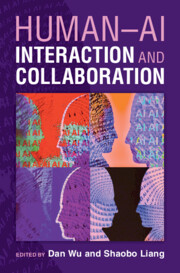Book contents
- Human–AI Interaction and Collaboration
- Reviews
- Human–AI Interaction and Collaboration
- Copyright page
- Contents
- Contributors
- Preface
- 1 Introduction
- 2 User Interaction for Human–AI Interaction and Collaboration
- 3 Privacy Identification of Human–Generative AI Interaction
- 4 Credibility Assessment of Human–Generative AI Interaction
- 5 AI-supported Crowdsourcing for Knowledge Sharing
- 6 AI-supported Search Interaction for Enhancing Users’ Understanding
- 7 AI for Human and Misinformation Interactions
- 8 Effective Human–AI Collaborative Intelligence
- 9 Human–AI Collaboration for Identifying Health Information Wants
- Chapter 10 Human–AI Collaboration for Scientific Discovery
- 11 Challenges of Generative AI on Human–AI Interaction and Collaboration
- 12 Conclusion
- References
6 - AI-supported Search Interaction for Enhancing Users’ Understanding
Published online by Cambridge University Press: 19 September 2025
- Human–AI Interaction and Collaboration
- Reviews
- Human–AI Interaction and Collaboration
- Copyright page
- Contents
- Contributors
- Preface
- 1 Introduction
- 2 User Interaction for Human–AI Interaction and Collaboration
- 3 Privacy Identification of Human–Generative AI Interaction
- 4 Credibility Assessment of Human–Generative AI Interaction
- 5 AI-supported Crowdsourcing for Knowledge Sharing
- 6 AI-supported Search Interaction for Enhancing Users’ Understanding
- 7 AI for Human and Misinformation Interactions
- 8 Effective Human–AI Collaborative Intelligence
- 9 Human–AI Collaboration for Identifying Health Information Wants
- Chapter 10 Human–AI Collaboration for Scientific Discovery
- 11 Challenges of Generative AI on Human–AI Interaction and Collaboration
- 12 Conclusion
- References
Summary
This chapter mainly investigates the role of Artificial Intelligence (AI) in augmenting search interactions to enhance users’ understanding across various domains. The chapter begins by examining the current limitations of traditional search interfaces in meeting diverse user needs and cognitive capacities. It then discusses how AI-driven enhancements can revolutionize search experiences by providing tailored, contextually relevant information and facilitating intuitive interactions. Through case studies and empirical analysis, the effectiveness of AI-supported search interaction in improving users’ understanding is evaluated in different scenarios. This chapter contributes to the literature on AI and human–computer interaction by highlighting the transformative potential of AI in optimizing search experiences for users, leading to enhanced comprehension and decision-making. It concludes with implications for research and practice, emphasizing the importance of human-centered design principles in developing AI-driven search systems.
Information
- Type
- Chapter
- Information
- Human-AI Interaction and Collaboration , pp. 135 - 152Publisher: Cambridge University PressPrint publication year: 2025
References
Accessibility standard: WCAG 2.2 AAA
Why this information is here
This section outlines the accessibility features of this content - including support for screen readers, full keyboard navigation and high-contrast display options. This may not be relevant for you.Accessibility Information
Content Navigation
Allows you to navigate directly to chapters, sections, or non‐text items through a linked table of contents, reducing the need for extensive scrolling.
Provides an interactive index, letting you go straight to where a term or subject appears in the text without manual searching.
Reading Order & Textual Equivalents
You will encounter all content (including footnotes, captions, etc.) in a clear, sequential flow, making it easier to follow with assistive tools like screen readers.
You get concise descriptions (for images, charts, or media clips), ensuring you do not miss crucial information when visual or audio elements are not accessible.
You get more than just short alt text: you have comprehensive text equivalents, transcripts, captions, or audio descriptions for substantial non‐text content, which is especially helpful for complex visuals or multimedia.
Visual Accessibility
You will still understand key ideas or prompts without relying solely on colour, which is especially helpful if you have colour vision deficiencies.
You benefit from high‐contrast text, which improves legibility if you have low vision or if you are reading in less‐than‐ideal lighting conditions.
